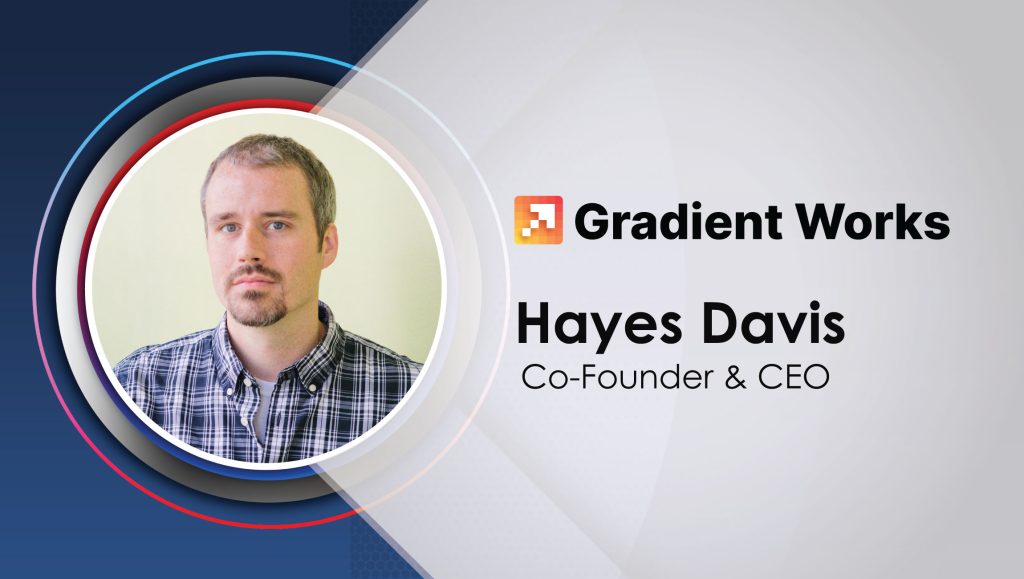What should sales and marketing teams keep in mind when building out their ICP details? Here’s what Hayes Davis, Co-Founder & CEO at Gradient Works suggests:
____________
Welcome to this SalesTechStar chat Hayes, tell us about yourself and more about Gradient Works: what inspired the platform? Take us through some of the latest features the team has been working on….
My background is in software development and revenue operations. I’m a second-time startup founder, and am CEO of Gradient Works.
We founded Gradient Works on the belief that the sales team of the future is account-based, dynamic, and ruthlessly focused on their ICP. That means sales reps aren’t stuck working static territories, that sales teams are agile and able to respond to changes in their market, and that they’re always striving for more efficiency.
The concept of dynamic books came from those beliefs. The highest-performing sales teams use a more modern way of assigning accounts to sales reps, continually matching the best available accounts with rep capacity. That’s dynamic books.
A dynamic books approach relies on books instead of territories. Every rep is assigned a book of accounts, based on account fit and in-market timing, as well as the rep’s available capacity. When an account is converted or disqualified, it moves out of the rep’s book and a fresh new account moves in.
Dynamic books allows sales teams to manage account supply and demand continuously. It also eliminates the need for annual territory planning and complicated territory spreadsheets.
So we’ve been building software to operationalize the dynamic books principles.
Earlier this year, we started to wonder – what if you could use the power of AI to better understand your ICP? Imagine an army of BDRs thoroughly evaluating every prospect across thousands of dimensions and identifying the ones most like your best customers. We built something to do just that: our new Market Map software. Market Map uses generative AI to research all the accounts in your CRM, evaluating their online presence to develop a deep understanding of their products and services – no prior firmographic enrichment required. This research then feeds a proprietary machine learning process that builds a customized look alike model. It’s a map to the best prospects in your CRM.
We’d love to hear your thoughts on some of the biggest lags you feel today’s AI powered sales tools don’t meet?
OpenAI’s GPT models, in particular, have driven so much of the hype around AI because we’ve never had a model this versatile and foundational packaged in such easy-to-use developer ergonomics. That’s what’s led to the rapid explosion of content generation and chatbot features in products today. Those are the most simple expressions of what these models allow, so it makes sense that we’re firmly in the “slap a chatbot in it” phase.
There are more powerful, much deeper use cases here, but they require a lot more effort to turn into a product. They’ll require pretty sophisticated machine learning (ML) pipelines that combine LLMs, other “classic” ML approaches, domain expertise and proprietary data. And, they’ll need to be packaged in a way that they actually serve users and not just make a cool tech demo. It will be interesting to see how many companies are able to transition from today’s “slap a chatbot in it” to tomorrow’s needs for rigorous product management, model optimization and good old-fashioned engineering effort.
Read More: SalesTechStar Interview with Olivier Gachot, CRO at LeanDNA
When it comes to building out ICP info, what are the common challenges and loopholes you see with marketing and sales teams and their processes? A few best practices when it comes to building out ICPs that you’d like to highlight.
B2B companies define their ICP with various firmographic, technographic, demographic and behavioral criteria to segment the universe of possible customers into accounts they can target. The challenge is that most of the criteria we use for ICP segmentation are based on inaccurate data and faulty assumptions. This results in imperfect and generalized account segments.
Because of that, many organizations end up wasting sales reps’ time and marketing budget trying to get in front of the wrong accounts. Their GTM efforts are inaccurate and inefficient.
Why does this matter? In boom times, companies aren’t as worried about waste. They had plenty of sales reps and marketing budget to go around. But now – when pipeline generation is down by 50%, sales cycles are 20-40% longer, win rates are down to 17-20%, and 54% of sellers are looking for a new job – sales and marketing teams absolutely cannot waste a single drop of GTM effort or sales quota capacity.
Teams need smarter segmentation and prioritization and become laser-focused on the highest potential accounts in a company’s market. A few best practices for getting your ICP into shape are:
1. Ensure your ICP is well-defined and precise with a thorough analysis of your existing customer base, and commit to reviewing it every 6 months.
2. Evaluate the firmographics and demographics in your ICP to confirm that they’re accurate.
3. Make customized GTM plans based on your ICP segmentation with a buyer journey content framework.
A few thoughts on the impact of AI on the future of marketing and sales?
Large language models give us the ability to generate content, but it might be even more important that they can deeply understand content. This is a fundamentally new capability that we’re only just beginning to tap into.
Sure, we can use generative AI to write more and better emails to prospects. But how can we use it to select the prospects we’re reaching out to in the first place? How can we use AI to refine our ICP, identify high-potential segments, and be sure our sales and marketing teams are aligned on the accounts we’re targeting?
Make no mistake, something unique is happening. Aspects of this new wave of models will move from the exotic to the mundane (think image recognition in photos) and aspects of these models are overhyped, but this isn’t hype without any meaningful use cases (looking at you crypto). There really is a step change in what’s possible. It’s going to be fun to be a part of it.
Read More: Elevating Women in Sales: A Path to Success and Inclusion
Gradient Works builds dynamic book management software that helps sales teams increase pipeline by continuously distributing the right accounts
Hayes Davis is the co-founder and CEO of Gradient Works, a seed-stage software company helping B2B sales teams drive pipeline with a hyper-efficient account coverage model called dynamic books. With over 15 years of experience as a GTM executive and revenue operations leader, Hayes and his team are empowering sales teams of the future with innovative technology to target the right accounts at the right time.
Missed The Latest Episode of The SalesStar Podcast? Have a quick listen here!
Episode 186 Using Email Signatures to Drive Marketing and Sales with Carol Howley, CMO at Exclaimer
Episode 185: Sales Improvements That Can Help B2B Teams Boost Growth with Jason Fitzgerald, SVP, Solution Network at OneStream Software
Episode 184: Al and Its Influence on Marketing: with Adri Gil Miner, CMO of Iterable





















